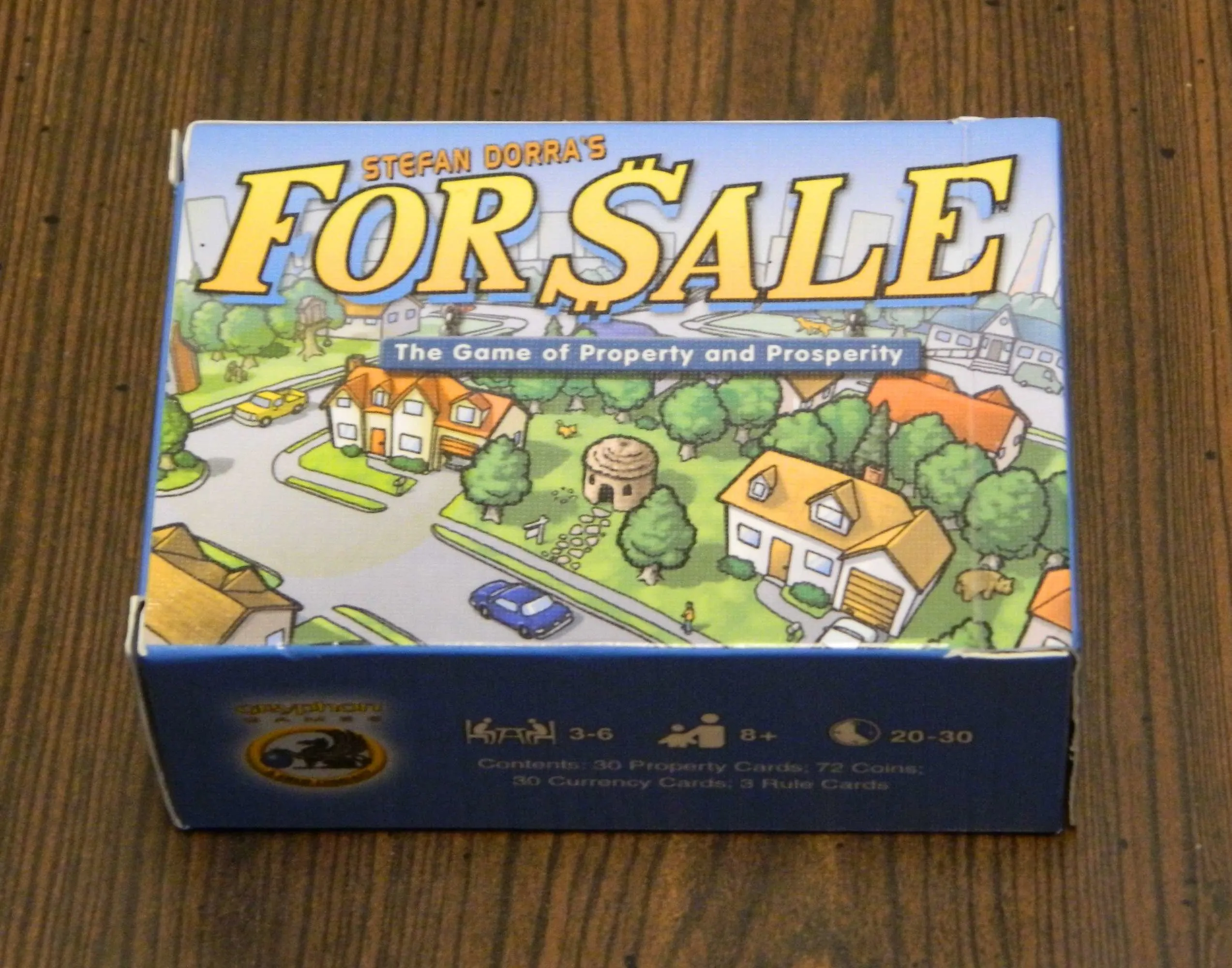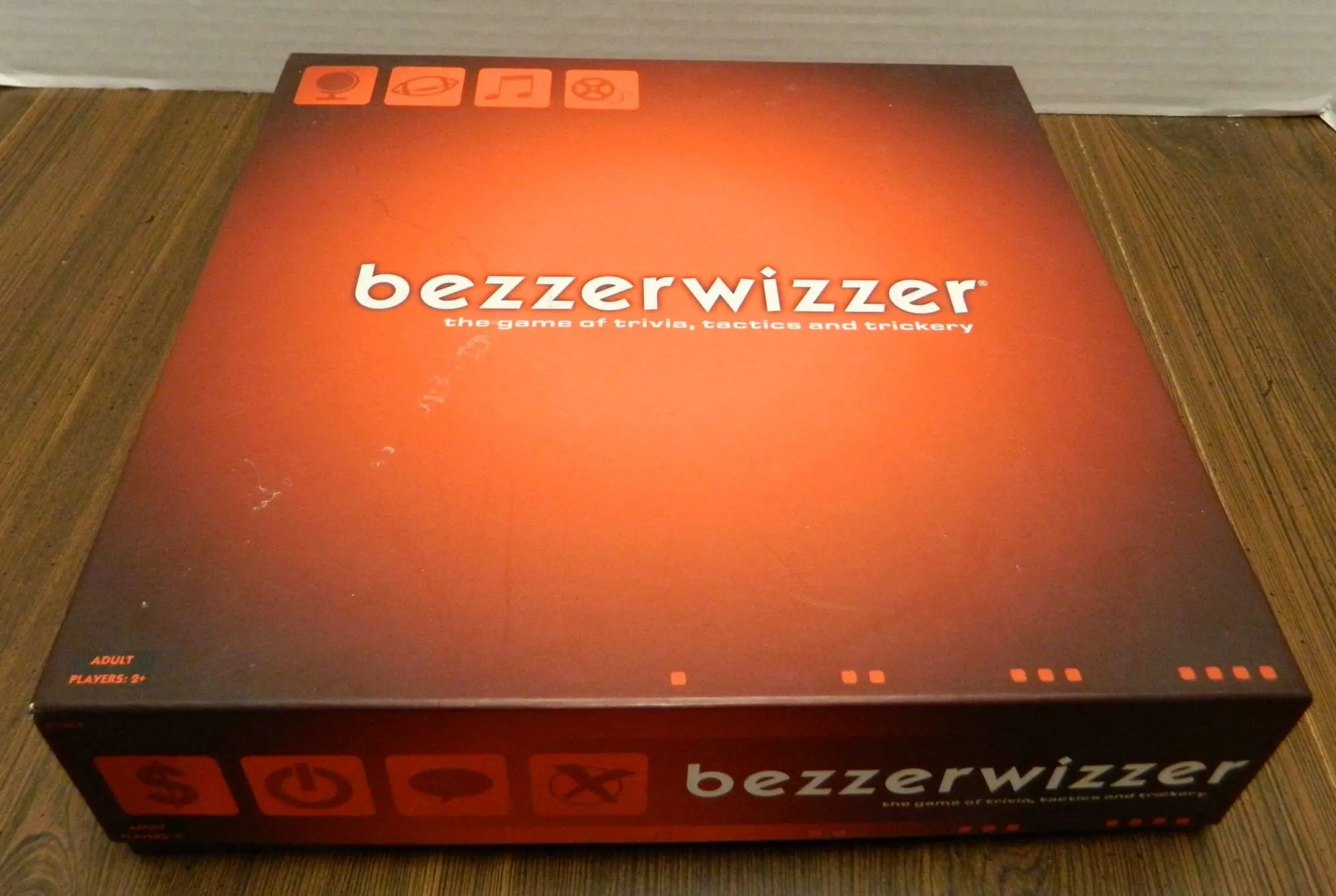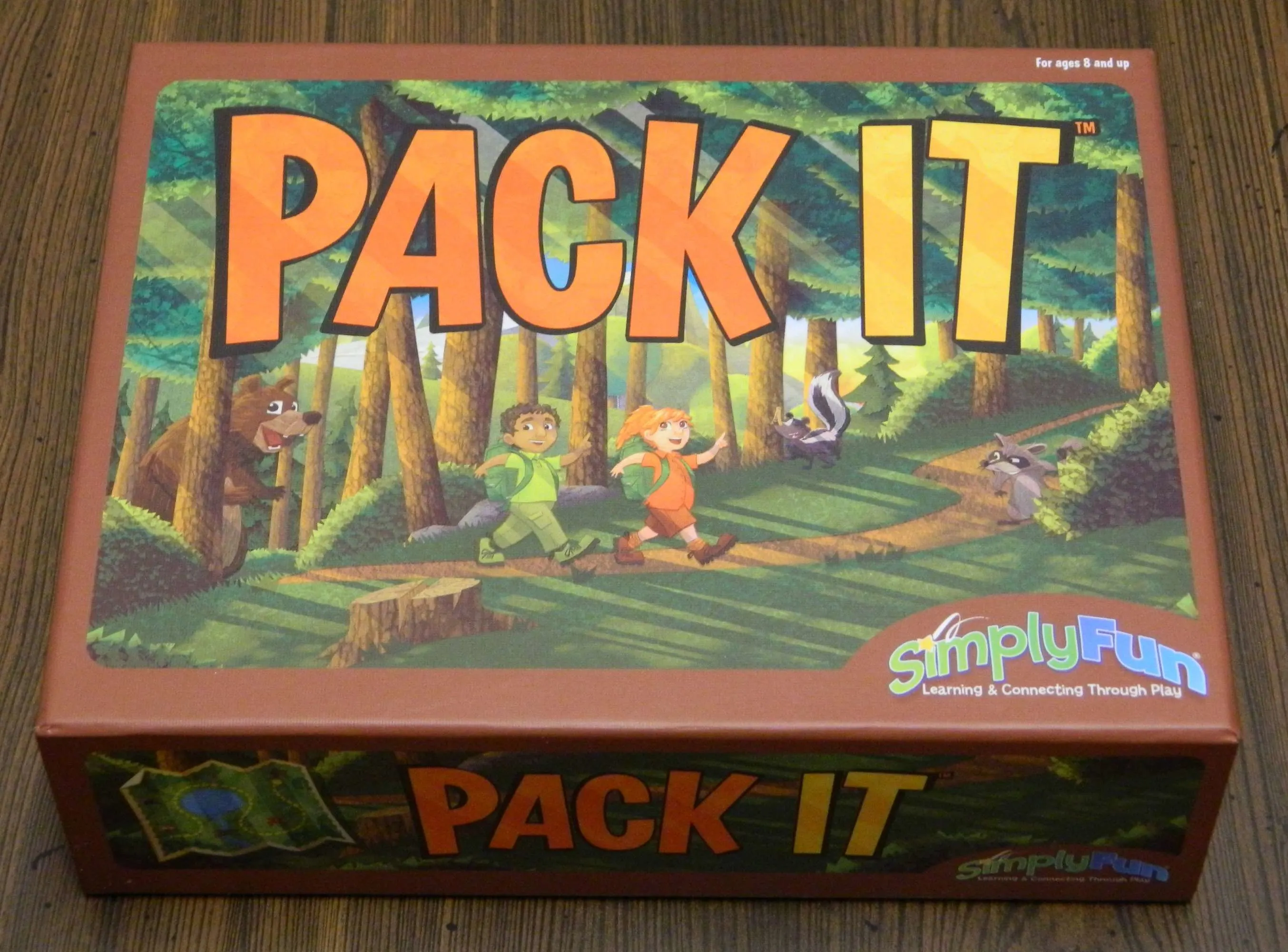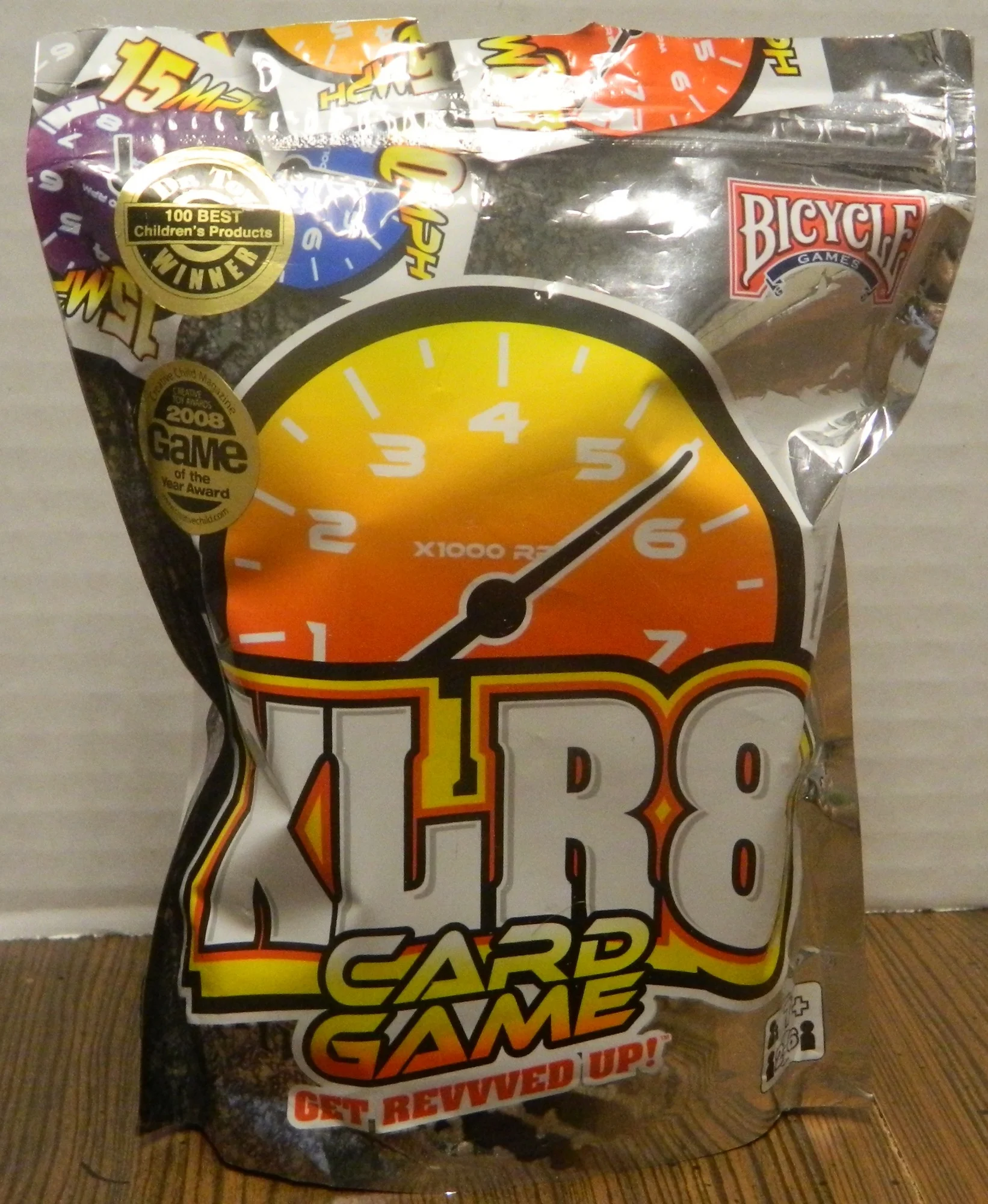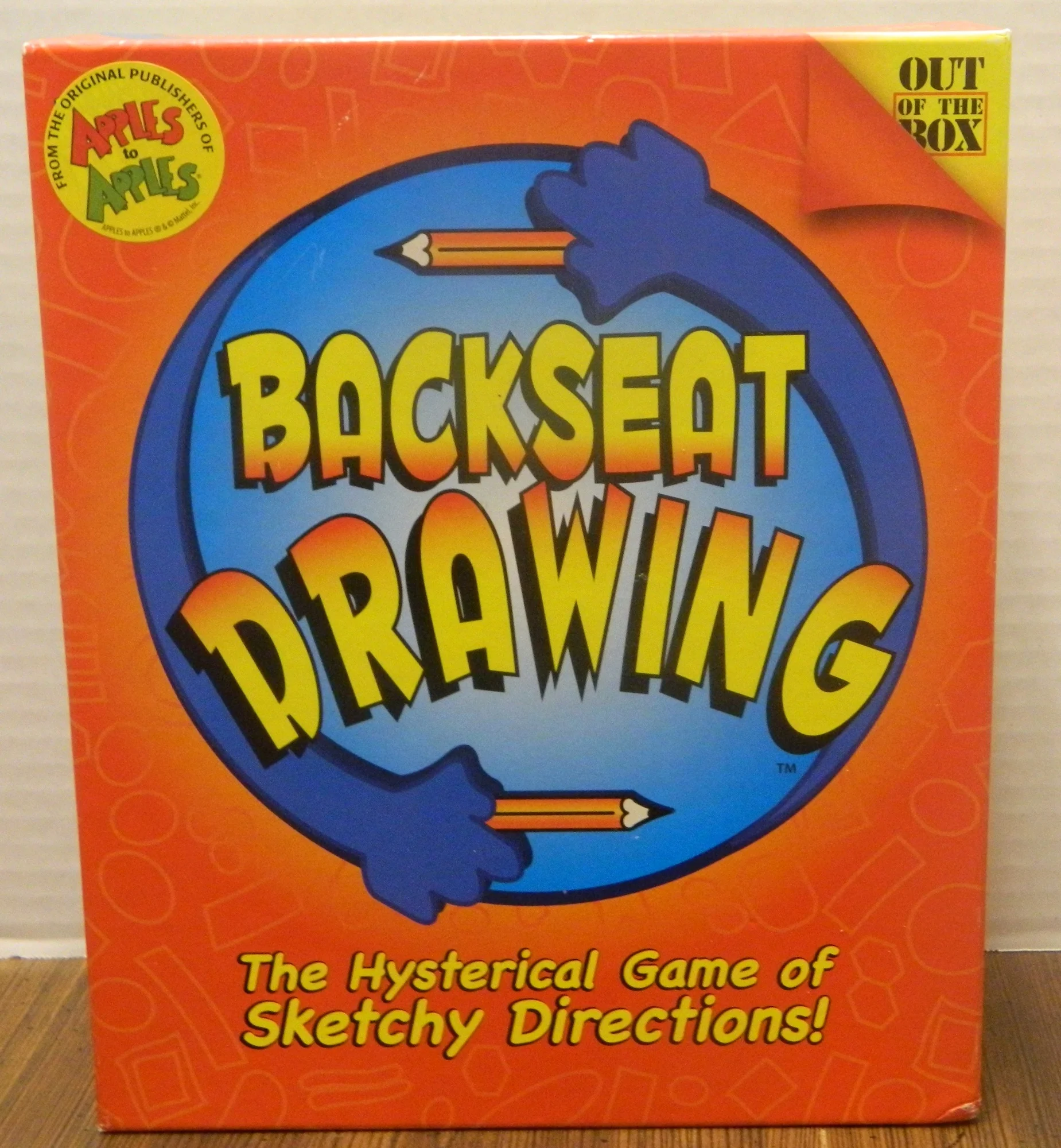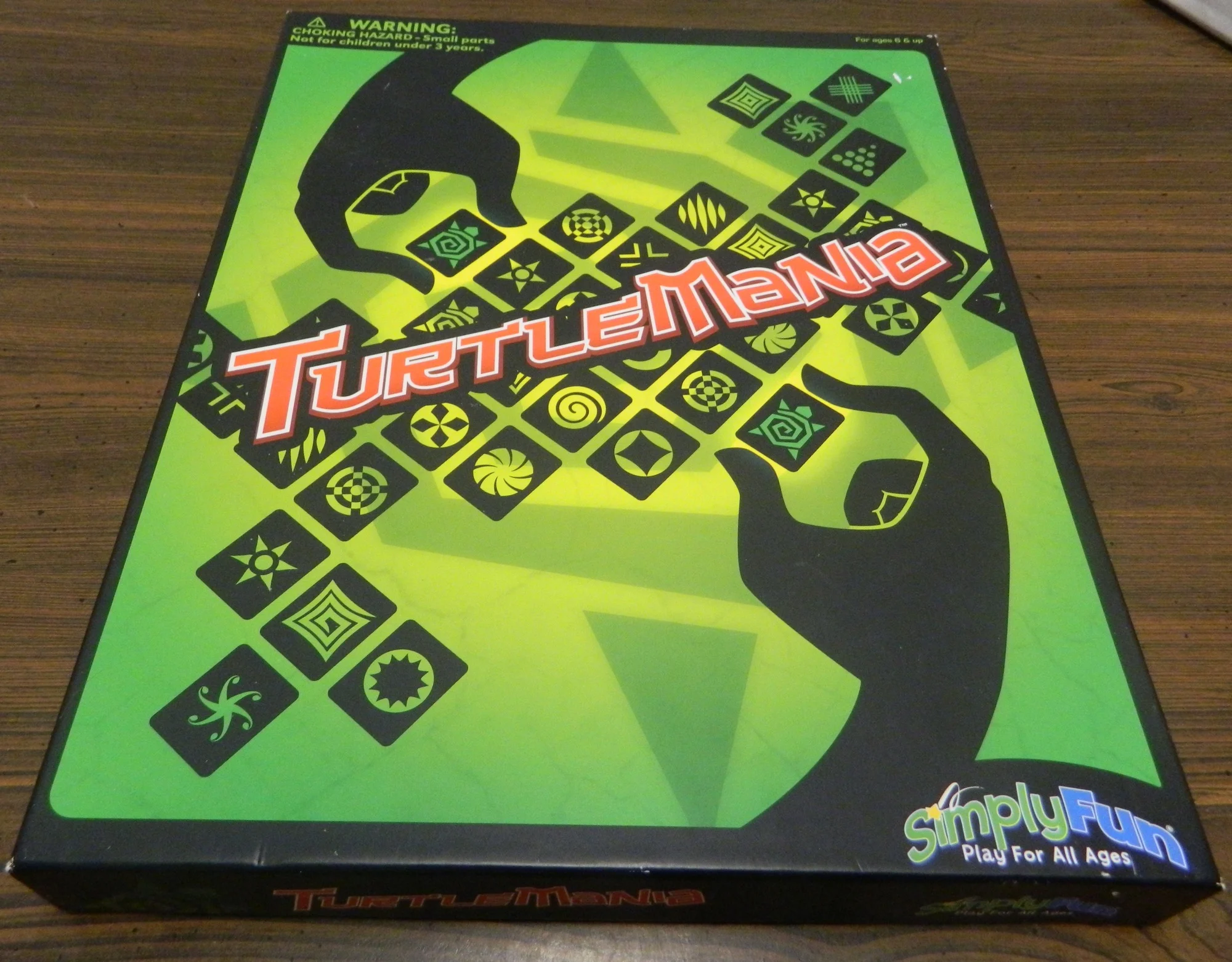How to Play
Setup
To start For Sale, separate the cards by type (green property cards and blue currency cards) and shuffle each pile. Set the currency cards aside for now as they will be used later in the second half of the game. Place the property cards face down in the center of the table. Next, give each player an equal amount of money depending on how many people are playing. For three or four player games, give each player two $2,000 coins and fourteen $1,000 coins. For games with five or six players, give each person two $2,000 coins and ten $1,000 coins. Also, if you are playing with three or four players you must also remove some property and currency cards from the game. With three players, remove six green property cards and six currency cards at random (without looking at them or revealing what they are). If you have four players, remove two cards of each type. These cards have to be removed from play to ensure that each player gets an equal amount of property cards (one per round).
Object of the Game
The object of the game is to bid the least amount possible to get the best possible property cards (the ones with the highest values, there is one card for every value from one to thirty). You then sell your (hopefully) extremely valuable property cards for the best currency cards you can in the second half of the game.
First Half of the Game (Buying Properties)
For Sale is a game with two distinct phases of gameplay. The first is where players bid on and buy properties. Start each round by turning up a number of green property cards equal to the number of players in the game (for example, for a four player game, turn the first four cards face up). These will be the properties that players will bid on for this round. In the first round, the player who lives in the largest house gets the honor of starting bidding. They have the option of bidding any amount of their coins or passing. Bidding continues clockwise (players always have to bid more than the previous bid, they can’t simply match it or they will have to pass) around the table until someone elects to pass. As soon as a player passes, they take the lowest value property on the table, add it to their hand (you will want to keep your property cards secret so other players don’t know what you are bidding with in the second half of the game), and are out of this round. Bidding then continues unless the next player also wants to pass (this happens a lot, as soon as someone passes other players tend to get out of the bidding as well). If they also pass, they take the property with the lowest value still on the table. A round ends once everyone has passed (the last player technically won’t pass but they obviously have no reason to bid anymore since they were the high bidder).
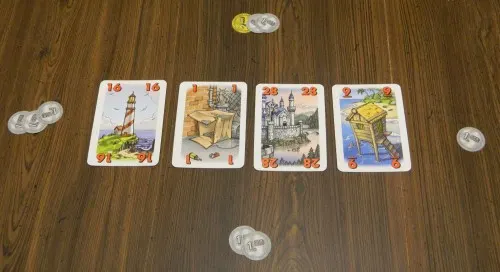
This is an example of a buying properties round. The player to the right was the first to bid and bid $1,000. Each of the next three players added $1,000 to the total (because they didn’t want to get stuck with the cardboard box).
If a player makes a bid but later elects to pass in the same round, they are entitled to reclaim some of the money they bid. As long as they weren’t the last player to pass, they get half of their bid back (rounded down). For example, if they bid $3,000 but when their turn to bid came up again decided to pass, they will get $1,000 ($3,000 rounded down) back in addition to the lowest valued property available. The rest of the money is returned to the bank (aka the box). The player that ultimately ends up bidding the most does not get this luxury. They lose all of the money they bid for the round (but they do get the property with the highest value).
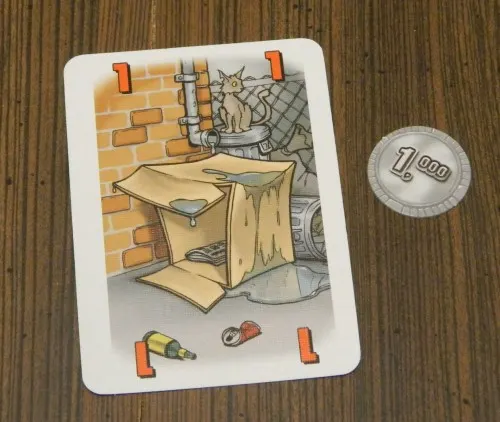
$5,000 (the next minimum bid amount) is too much for this player. They decide to drop out of bidding and take the lowest valued property (the cardboard box). They also lose the $1,000 they previously bid (because $1,000 rounded down is $0) but if they had bid $2,000 they would have gotten $1,000 of that amount back.
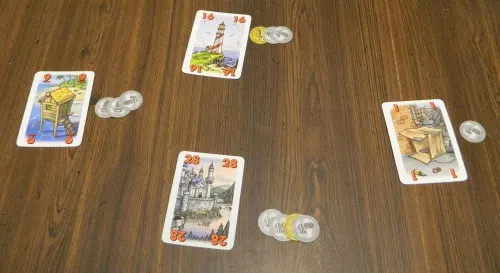
With the horrible cardboard box property gone, the bidding quickly comes to an end (though the next player does raise the bidding a bit more to secure the sweet castle property). The player on the left is the second player to drop out so they get the second least valuable property (the ocean hut). The top player is happy to just take the lighthouse and the bottom player gets the best property since they stayed in the longest. The player on the left gets $1,000 of their bid back ($3,000 rounded down), the top player gets $2,000 back, and the bottom player loses their entire bid (since they were the last player in the bidding).
After the first round of bidding is complete, the player who got the most valuable property in the previous round starts the new round. Each round in the first stage of the game is the same, you turn over enough property cards so that each player can get one and then bid or pass until everyone has gotten a property. No matter how many players you have (as long as you took out the amount you were supposed to), each player will get one property per round (even if they never bid and just elect to pass right away) and no player will ever go empty-handed. You don’t have to use all of your coins to buy properties, any unused coins from the first stage are worth their face value at the end of the game (for example, if you hang onto $5,000 worth of coins you will get $5,000 added to your total at the end of the game). Once all of the property cards have been taken, it’s time for the second stage of For Sale.
Second Half of the Game (Selling Properties)
Now that all of the properties have been bought, it’s time to sell them for the most money you can. Players will be selling their property cards for currency cards (whose values range from $0 to $15,000). Just like phase one, a number of currency cards are turned face up equal to the amount of players in the game. However, instead of using your coins this time you are using the property cards you earned in the first half of the game as your ammunition. You will play the same amount of rounds in this phase as you did in the previous one (you’ll sell each and every one of your property cards). In each round, every player secretly picks out one (you can’t bid multiple cards in a single round and probably wouldn’t want to anyway) of their property cards to use to bid for the currency cards currently up on auction. They place them face down on the table until everyone has made their bid. Then, all players turn the card they bid over and compare properties.
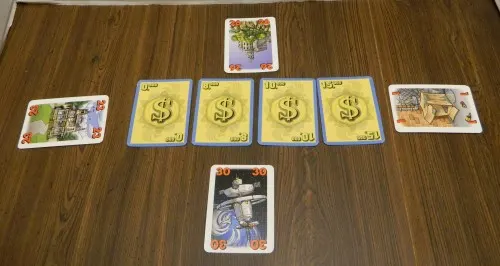
With both the best and worst currency cards available, the strategies these players use is wildly different. The bottom player knows this is a great time to use the best property card in the game to ensure $15,000. The top and left players also bid high to make sure they don’t get a bad currency card. Meanwhile, the player on the right knows they can’t compete so they decided to just burn their cardboard box card knowing that they will wind up with the $0 currency card anyway (or have to overpay for a solid but unspectacular $8,000 or $10,000 card).
The player with the highest valued property card gets to take the highest currency card (the second place player gets the second most valuable currency card, etc.). The player who bids the least valuable property gets stuck with the worst currency card (which could even be worth $0 which really hurts your chances of winning). Since the currency cards available are random, you could have situations where all of them are within a couple thousand of each other (in which case you probably want to bid one of your low cards so you don’t waste a higher value card when you have little or nothing to lose) or one where there are one or two really high value cards and two terrible ones (you’ll have to bid high in this situation unless you know you can’t compete with the other players). Property cards are discarded out of play once they are used to bid on a currency card.
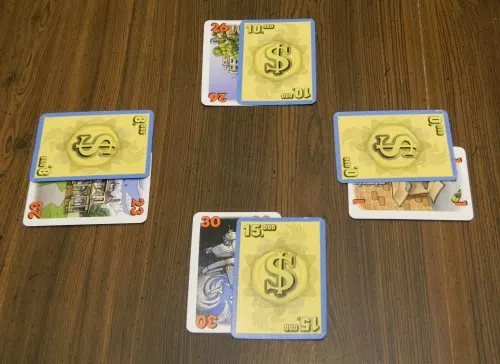
The results of this selling round. Since there was a $15,000 currency card, the bottom player decides to sell his space station. The player at the top played the second most valuable property so they get the second best currency card. The left player (third best) and right player (worst) get what is left.
Each round of the second stage of the game is played the same way (though you will obviously have fewer property cards to choose from each round), new currency cards are drawn and placed on the table and then players bid their property cards and take the currency card they won for the round.
Game End
For Sale ends when all players have sold all of their properties. Players add up the value of all of their currency cards and any remaining coins they have and the richest player wins the game. If two or more players are tied at the end of the game, the player with the most remaining coins breaks the tie and wins the game. If two or more players are still tied, the game doesn’t say what to do about the tie (I guess you could just call it a tie, play another game to serve as the tiebreaker, or come up with whatever other criteria you want).
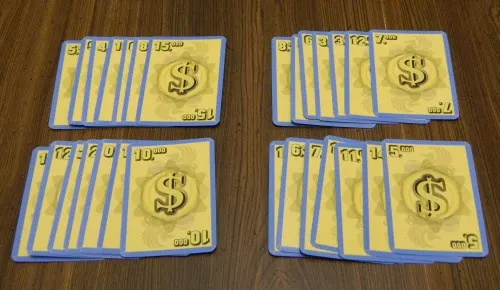
The game has ended and all players add up the currency cards they have acquired (along with any coins they have left). The player with the most money wins.
Review
Easy to Learn, Quick and Fun to Play
Even before I purchased For Sale (for a very good price as you can see in my Thrift Store Haul post), I had heard of it and knew it was a great game that I would definitely enjoy. The game is ranked in the top 250 on Board Game Geek and appears on lots of “best games lists” for a very good reason, it’s a very simple and elegant game that is extremely easy to learn and can easily be played in ten to fifteen minutes once you know what you are doing. For Sale is extremely well designed for a small card game.
The game is so easy to learn that even my father who often struggles with learning the rules to even relatively simple games knew what he was doing. I think kids as young as eight should be able to learn the game and it does teach them a valuable financial lesson about buying low and selling high (and trying to maximize value out of your hard-earned money). Some younger kids might struggle with the rules a little bit or require a bit more teaching but For Sale is overall a very good game for families (yet strategic enough for hardcore gamers as well).
For Sale is a game that pretty much anyone should enjoy. It’s great for inexperienced gamers or as a gateway game to introduce your family to games not named Monopoly, Clue, or Scrabble. Even your grandma could probably learn how to play it and should enjoy it.
Another great thing about For Sale is that the games are extremely quick (ten to fifteen minutes). Since it’s so easy to teach and games go by very quickly, it’s pretty much the perfect filler game. However, I must warn you that the game is very addicting. If you play it as a warmup game to your main game for your game night, you might wind up playing seven games of For Sale and run out of time for your other game(s).
Decisions, Decisions
For a small card game, For Sale definitely offers players a lot of interesting decisions to make and utilizes a lot of different skills. In any given round, you will have to decide whether or not it’s worth bidding on the properties (or whether it is a better deal to just keep your money and take one of the low value properties), how much you want to bid, what you think your opponents will do (if you think they really want to bid the most in the round, you might be better off cutting your losses, saving your money, and sticking them with the bag), and try to remember which properties have already been bought (if a lot of the high value properties are still somewhere in the deck it might be a good idea to save your money for later).
Once you get to the second stage of the game, your ability to read your opponents and your memory becomes extremely important to the game. If after several rounds of bidding a $15,000 currency card comes out, it is very valuable to remember which property cards have been played (and which ones are still out there waiting to be played) because you might wind up overbidding for it (or someone else has a more powerful property card and you wind up wasting a great property card and only get the second best currency card for it). If you can read your opponents well (and predict what they are going to do) and you have a good memory, you have a significant advantage in the second stage.
One really cool thing about For Sale is that because different combinations of properties and currency cards will come out, each round and game you play will require different strategies. Some rounds will have properties that are all pretty close together in terms of value so you’ll probably want to be more conservative (since you don’t lose much by not bidding much). Sometimes the properties will have wildly different values and you will have to be aggressive (but not too aggressive) so you don’t wind up with the terrible properties.
Because of the randomness of the game, there are actually situations where you could earn more money from the worst property (the cardboard box home) than the high value mansions. For example, let’s say one round goes like this. There is a $15,000 currency card but all of the rest are $3,000 or less. Most players will bid with their highest cards on this one because of the huge difference in value, one player might play their 29 card but if another player uses the best card in the game (the space station one with a value of 30) they will only get $3,000 from it. Meanwhile, the next round all of the currency cards could be worth at least $10,000 each. In this case, the player who bought the cardboard box home should use it here and they will actually earn more money than the player with the 29 card did in the previous round (since all of the currency cards in this round were worth more than $3,000). Some people might not like all the randomness the game throws at you but I like that it forces you to make tough but interesting decisions. The different situations the game throws at you add a lot of spice to the game.
Solid Production Value
Even though you are only getting 60 cards and 72 “coins” in the (very small) box, the production value is overall pretty good. The property card art is particularly awesome with some very high quality depictions of houses of all sizes and types (including a cardboard box home, several mansions, and a home on a space station). The art on the property cards is so great that I can look past the relatively lackluster design on the currency cards and coins (they look fine but a little boring). One small complaint I have about the components is the coins are made of such thin paper that they are sometimes hard to get off the table. However, since the game is pretty cheap (it retails for around $15) and you’ll most likely get many plays out of it (so it grades very highly on my play time to dollars spent ratio), this isn’t that big of a deal.
One (Small) Complaint
While For Sale is a great game that will most likely make my top 100 games of all-time list whenever I make it, it isn’t quite perfect. There is one thing that might annoy certain players. Since, the game is a mix of an auction game and blind bidding, there is obviously a lot of luck involved. While I personally don’t mind and players who can read other players and memorize what cards have been played can use their skills to give them an advantage, I’m sure there are some gamers who hate any game with a relatively high luck factor. Those gamers might not like For Sale because the luck factor is still pretty significant. However, this did not impact my rating whatsoever because I think the luck factor is more than fair in this game.
Final Verdict
A Classic That Everyone Should Enjoy
For Sale is a classic game that definitely earned all the praise an accolades it has received. It’s one of the best card, family, and auction games I have ever played and will almost certainly make my top 100 games of all-time list. I recommend that every gamer should at least give it a try and I suspect that a large majority will wind up liking it. For Sale is great for both hardcore gamers and people new to designer games. Highly recommended for all gamers.

